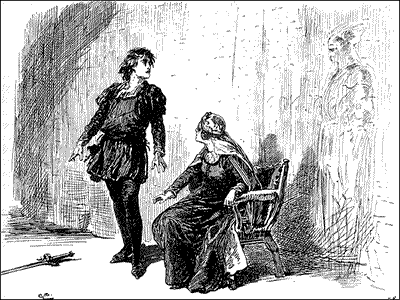![]()
The ghost internalized
 |
The twentieth century gave birth to a tendency to psychologize the ghost, presenting it as a manifestation of Hamlet's consciousness. In several productions, no ghost actually appeared at all, and in some, his dismembered voice was that of the actor playing Hamlet. Major actors, such as Richard Burton, Nicoll Williamson, and Jonathan Pryce played their Hamlets against invisible ghosts. An early and important spokesperson for this movement was W.W. Greg who argued that the ghost was nothing other than a manifestation of Hamlet's overheated brain.
|
Further, we have seen that it is impossible to regard the narrative of the Ghost as a genuine revelation, but that, on the contrary, it bears internal evidence of being but a figment of Hamlet's brain, and, moreover, that this hypothesis resolves most of the difficulties that have been thought inherent in the play. It is tempting to advance a step further, and to argue that Shakespeare not only constructed his play on the basis of an hallucination on the part of his hero, but that he intended the Ghost to be an illusion throughout. --Walter Wilson Greg, "Hamlet's Hallucination", The Modern Language Review, October, 1917. p.419. But the ingenious reader will already have made the obvious inference. The ghost described this particular method of poisoning because it was already present in Hamlet's mind. In other words it was not the Ghost's story that suggested the Murder of Gonzago, but the Murder of Gonzago that supplied the details of the Ghost's story. This simple assumption at once removes the difficulty of the coincidence, and explains the one obscure point regarding the Ghost's narrative. Our chain of evidence is complete. (p.416) |
Needless to say, critics such as John Dover Wilson or Eleanor Prosser, who take a historical approach to Hamlet, find this hallucination theory infuriating. Their entire approach emphasizes the hard reality and genuine dramatic threat of the ghost, and they point out that Hamlet is not the only one to see it. Indeed, three other trustworthy witnesses attest to its reality even before Hamlet encounters it.
| The first act is a little play in itself, and the Ghost is the hero of it; 550 out of 850 lines are concerned with him. Moreover, he is a very real spirit. Caesar at Philippi may be a student's dream; Banquo at the feast may be a false creation proceeding from Macbeth's heat-oppressed brain; but there can be no doubt, if Dr. Greg will forgive me, about the objectivity of the spectre of King Hamlet. -- John Dover Wilson, What Happens in Hamlet, Cambridge University Press, Cambridge, 1935, p.52 |